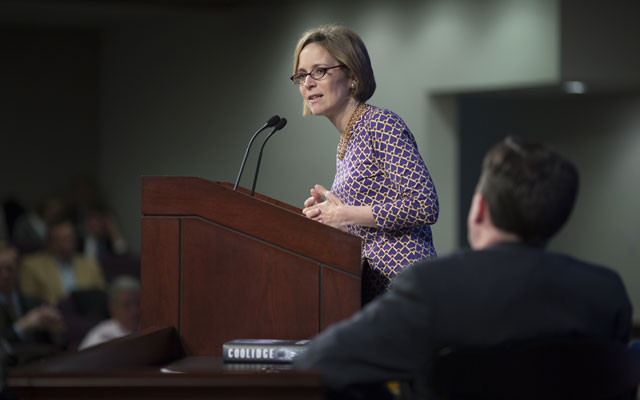Celebrating Coolidge: Champion of Budget Cuts, Tax Reductions
Rich Tucker /
“You never want a serious crisis to go to waste,” former White House Chief of Staff Rahm Emanuel famously said. Since then, the country has spent the Obama Presidency lurching from one crisis to the next. From the debt ceiling to the fiscal cliff to, today, the sequester, the federal government seems to be in permanent crisis mode.
It doesn’t have to be this way.
As author Amity Shlaes explained in an appearance at The Heritage Foundation, President Calvin Coolidge understood that “government should be dull.” During his tenure, she says, many people decided they didn’t want “face time” with the President, and that suited Coolidge just fine—all the action was outside the White House, in the booming private sector.
In her new book, Coolidge, Shlaes tells the story of a leader who “used his skill in government to make government smaller.” He vetoed 50 bills, and used the pocket veto to kill many more.
Shlaes explains that Coolidge was reserved—painters had a difficult time capturing his likeness because he had trained himself to make his face blank. Yet the nation’s 30th President was a man of principles. “Governments do not make ideals, but ideals make governments,” he said, while celebrating the 150th birthday of the Declaration of Independence.
“I am for economy, and after that more economy,” Coolidge said. “At this time and under present conditions that is my conception of serving all the people.”
By “economy” he meant slashing government spending. And by “serving all the people” he meant allowing people to succeed. The federal budget was smaller when “Silent Cal” left office than it had been when he was sworn in. “His greatest legacy as President is his incredible reduction in spending and taxes and the economic prosperity that resulted from his policies,” writes Heritage visiting fellow Joseph Postell.
He also focused on reducing taxation. When the government of South Africa donated two lion cubs to the U.S., Coolidge named them “Budget Bureau” and “Tax Reduction” to show he was equally concerned with reducing federal spending and the tax burden on Americans.
“The calmness of Coolidge tamped down talk of crisis” throughout his presidency, Shlaes said. He possessed a natural humility, and worked to prevent the federal government from infringing on the rights of state governments and civil society.
“We’ve had a President who said ‘no’ to government spending,” Shlaes said. Observers of the modern, hyperactive Presidency would be right to think that we could use a man like Calvin Coolidge again.

